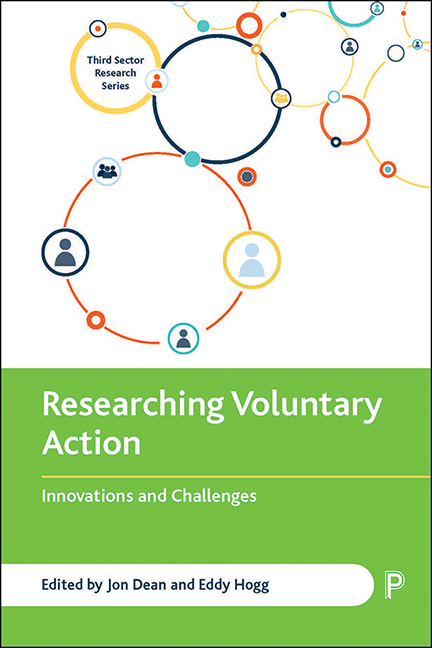Book contents
- Frontmatter
- Contents
- List of figures, tables and boxes
- Notes on contributors
- Acknowledgements
- Series editor’s foreword
- 1 Introduction
- 2 (Un)suitable methods and reflexive considerations: an interview and focus group study of youth volunteering
- 3 Interpretive ethnography: a UK charity shop case study
- 4 Collaborative philanthropy and doing practically relevant, critical research
- 5 Peer research: co-producing research within the context of voluntary and community action
- 6 Charity advertising: visual methods, images and elicitation
- 7 Using archives and objects in voluntary action research
- 8 Using Mass Observation as a source of qualitative secondary data for interdisciplinary longitudinal research on voluntary action
- 9 Investigating meanings and messages on volunteering through television media
- 10 Annual reporting in voluntary organisations: opportunities for content analysis research
- 11 Researching risk in the voluntary sector: the challenges and opportunities of regulatory data
- 12 Exploring the benefits of volunteering: combining survey and administrative data in the Nordic ‘laboratory’
- 13 Spatial approaches to the voluntary sector
- 14 Restudies, surveys and what counts as volunteering
- 15 Conclusion
- References
- Index
13 - Spatial approaches to the voluntary sector
Published online by Cambridge University Press: 15 September 2022
- Frontmatter
- Contents
- List of figures, tables and boxes
- Notes on contributors
- Acknowledgements
- Series editor’s foreword
- 1 Introduction
- 2 (Un)suitable methods and reflexive considerations: an interview and focus group study of youth volunteering
- 3 Interpretive ethnography: a UK charity shop case study
- 4 Collaborative philanthropy and doing practically relevant, critical research
- 5 Peer research: co-producing research within the context of voluntary and community action
- 6 Charity advertising: visual methods, images and elicitation
- 7 Using archives and objects in voluntary action research
- 8 Using Mass Observation as a source of qualitative secondary data for interdisciplinary longitudinal research on voluntary action
- 9 Investigating meanings and messages on volunteering through television media
- 10 Annual reporting in voluntary organisations: opportunities for content analysis research
- 11 Researching risk in the voluntary sector: the challenges and opportunities of regulatory data
- 12 Exploring the benefits of volunteering: combining survey and administrative data in the Nordic ‘laboratory’
- 13 Spatial approaches to the voluntary sector
- 14 Restudies, surveys and what counts as volunteering
- 15 Conclusion
- References
- Index
Summary
Introduction
How we understand and represent the world through a spatial lens is changing. Spatially referenced data are ubiquitous, and analytical tools such as geographic information systems (GIS) are increasingly accessible and more intuitive than their predecessors. The fruits of the Fourth Industrial Revolution embed novel socio-spatial ontologies into not only our knowledge of the world but our lived experience. Policy initiatives such as the UK's Cabinet Office-led Geospatial Commission see great economic and social value in widening access to spatial data. In the social sciences, proponents of a spatially integrated social science espouse the elucidating power of spatial perspectives and methods for pertinent social challenges.
This chapter shows how this rapidly changing field has been, and can be, applied to study the voluntary sector. It starts by outlining the utility of a spatial orientation for academic and practice-based studies of the voluntary sector, before turning to the benefits and idiosyncratic challenges of regulatory data, grant-making data, spatial indexes and classifications and local government data for exploring the voluntary sector. Relevant data sources having been explored, the tools and approaches to spatial data visualisation are shown and then critically explored in the light of established methodological and ethical concerns. Finally, innovative approaches are encouraged in order to further our spatial understanding of the voluntary sector.
While the chapter draws heavily on the work of academic voluntary sector scholars, it is hoped that it will not only stimulate spatial thinking but also provide practical guidance for practitioners and scholars alike who wish to map and examine the spatial manifestations of the voluntary sector. My primary research interest, the use of spatial data by voluntary sector practitioners, has showed the need for such guidance. To give a broad overview and maintain a focus on the voluntary sector, the chapter only touches on matters of spatial statistics and instead refers readers to indepth resources.
Understanding the spatial nature of voluntary action
Scholars in this field have utilised a broad range of data sources and methods to present spatially orientated perspectives of the voluntary sector. Studies range in scope from simple analyses of organisational density at varying spatial scales, to understanding the impact of spatially prevalent political ideologies on the aims of voluntary organisations. The question that has received the most attention concerns the spatially equitable distribution of voluntary effort in response to social need.
- Type
- Chapter
- Information
- Researching Voluntary ActionInnovations and Challenges, pp. 146 - 159Publisher: Bristol University PressPrint publication year: 2022



